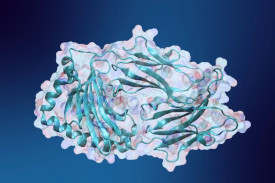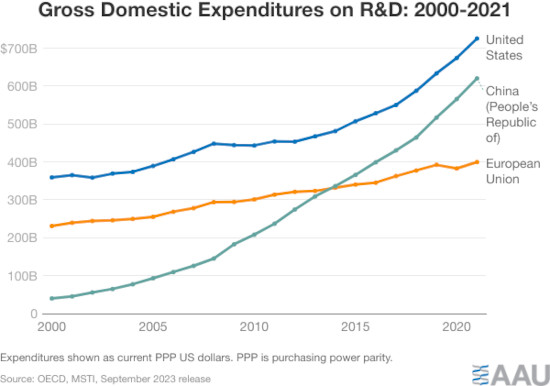 AAU Members Ready for the Solar Eclipse
AAU Members Ready for the Solar Eclipse
Later today, the moon will completely block the sun and, for a few minutes, plunge a strip of the United States – about 115 miles wide, and running from Texas to Maine – into temporary darkness. AAU institutions in the path of totality are using today’s solar eclipse to bring together community and advance scientific research.
In Indiana, two AAU members are located right in the middle of the path of totality. According to Purdue University, this will be Indianapolis’s first total solar eclipse in 819 years. To mark the momentous occasion, Purdue is presenting a Total Solar Eclipse Event at Indianapolis Motor Speedway that will offer educational programming featuring experts from the university and from NASA. At the nearby campus of Indiana University Bloomington, researchers are planning to use the few hours of diminishing light during the day to study bird behavior. The researchers hope to harness the power of community science to collect data about how the change in light and total darkness during the eclipse affect birds.
In New York, the University of Rochester and the University at Buffalo are both in the path of totality. Students and scientists at the universities are working with the Citizen Continental-America Telescope Eclipse project funded by NASA and the National Science Foundation to capture images of the sun during the eclipse. The data collected will help NASA study the solar corona and the sun’s outer atmosphere.
If you are within the path of the eclipse, make sure to check your nearby AAU campus for events happening today!
 AAU President Pens Op-Ed on Biden Administration Proposal That Would Turn Back the Clock on American Innovation
AAU President Pens Op-Ed on Biden Administration Proposal That Would Turn Back the Clock on American Innovation
Last month, Real Clear Health published an op-ed by AAU President Barbara R. Snyder on why the Biden administration’s proposal to expand the criteria for when federal agencies can exercise “march-in” rights granted to them under the Bayh-Dole Act would stifle innovation and “turn back the clock on four decades of beneficial collaboration between leading research universities and the private sector.”
Last December, the National Institute of Standards and Technology proposed a framework that would allow federal agencies to effectively seize university patents for any product developed with federal research funding that officials believe is not “reasonably priced.” President Snyder urged the administration to reject the proposal, which would chill the transfer of valuable technology from research universities to markets by sending a message to the private sector that federally funded discoveries at universities are risky investments.
“For the past four decades, universities and private companies have worked together to develop new products that improve health, create jobs, and boost the innovation economy that has made the United States the world’s technological superpower,” she wrote, adding: “We need President Biden to defend the law that makes this cooperation possible.”
 AAU Staff Recognized for Contributions to Graduate Professional Development
AAU Staff Recognized for Contributions to Graduate Professional Development
AAU Deputy Vice President for Institutional Policy Emily Miller is being honored by the Princeton Graduate School “for her foundational and influential work in graduate student professional development” and for her work on AAU’s PhD Education Initiative.
Miller will receive the school’s GradFUTURES 2024 GRADitude Award this week and will participate in a “fireside chat” with Princeton Graduate School Dean Rodney Priestley about the future of graduate education. The GRADitude Award committee especially noted “the profound impact” AAU’s PhD Education Initiative has had “in shifting institutional culture and the professional development paradigm of graduate institutions across the country.”
Miller has been with AAU since 2012 and is responsible for advancing transformational organizational change initiatives in undergraduate and graduate education. She is currently directing AAU’s Evaluating Effective and Equitable Teaching at Research Universities project, which is focused on transforming how educational contributions at research universities are assessed in the faculty rewards system and on ensuring that undergraduate STEM instruction is more equitable and effective. Miller also represents AAU on the National Academies’ Roundtable on Mentorship, Well-being, and Professional Development.
 ICYMI: AAU Submits Comment Letter on NIST Framework on “March-in” Rights
ICYMI: AAU Submits Comment Letter on NIST Framework on “March-in” Rights
Education Department Delays Gainful Employment, Financial Value Transparency Reporting Deadline
In response to a request by the higher education community, including AAU, the Department of Education has extended the deadline for institutions of higher education to start reporting data related to financial value transparency (FVT) and gainful employment (GE) to October 1. The requirements are contained in a final rule released by the department last year. The initial reporting deadline for colleges and universities was July 31.
AAU joined the higher education community last month in asking the department to delay all reporting requirements related to FVT/GE to allow institutions to focus instead on navigating delays associated with the rollout of the Free Application for Federal Student Aid (FAFSA). In an announcement last week, the Department of Education noted that it is adjusting the timeline for FVT/GE reporting to allow institutions “to focus their efforts on getting aid to students this spring and to have more time to compile data.”
News of Interest
The Washington Post: Stanford Appoints Business School Dean as Its Next President – Stanford University announced last week that it is appointing Stanford Graduate School of Business Dean Jonathan Levin as its next president. Levin will begin his tenure on August 1.
AP News: South Korean Computer Chipmaker Plans $3.87 Billion Indiana Semiconductor Plant and Research Center – South Korean chipmaker SK Hynix plans to spend “more than $3.87 billion in Indiana to build a semiconductor packaging plant and research and development center” at Purdue Research Park, an “economic development incubator” at Purdue University. “This transformational investment reflects our state and university’s tremendous strength in semiconductors, hardware AI and development of the Hard-Tech Corridor,” said Purdue University President Mung Chiang.
Higher Ed Dive: 330,000 FAFSAs Must Be Reprocessed, Education Department Says – The Department of Education said that it will need to reprocess about 330,000 federal financial aid applications after they were found to contain tax data errors “that would make students eligible for less financial aid than they are entitled to.” The errors add to the challenges colleges are facing in delivering timely financial aid offers to students since the bumpy rollout of the new Free Application for Federal Student Aid (FAFSA).
Government Technology: Vanderbilt Plans New College of Computing, AI and Data Science – Vanderbilt University is establishing a new College of Connected Computing dedicated to computer science, artificial intelligence, and data science. The interdisciplinary college aims to meet growing demand from employers for graduates with technological degrees and advance research in “key areas of computer science and also in a wide range of other disciplines that capitalize on advanced computational methods.”
USA Today: Colleges to Education Department: We Don’t Have Enough Time to Process FAFSA Information – A recent survey conducted by the American Council on Education revealed that a majority of colleges are struggling to process student financial aid data due to repeated delays in the FAFSA rollout. The survey results were detailed in a letter sent to Education Secretary Miguel Cardona.
Axios: A New World for Science Research Security – A new report recommends that, instead of placing controls on broad scientific fields to protect them from foreign espionage, the National Science Foundation should “assess the sensitivity of proposed research on a project-by-project basis.” AAU Senior Vice President for Government Relations and Public Policy Toby Smith called the recommendation reasonable and noted that restricting broad research categories would “harm our ability to advance fundamental science in critical areas.”
Featured Research

ASU Researchers Develop AI-Based Tool Paving the Way for Personalized Cancer Treatments
A team of scientists from Arizona State University has developed an artificial intelligence-based learning tool called HLA-Inception that could speed up the fight against cancer. The innovative tool helps uncover “information about how an individual person’s immune system responds to foreign cells” and could help doctors provide personalized, precise medicine to cancer patients.

More Schooling Is Linked to Slowed Aging and Increased Longevity
A new study by researchers at Columbia University reveals that higher educational attainment is associated with a slower pace of aging. The researchers found that “two years of additional schooling” can lead to a 2-3% slower pace of aging, which in turn “corresponds to a roughly 10 percent reduction in risk of mortality.” The findings suggest that higher educational attainment can “slow the pace of biological aging and promote longevity.”
Stat of the Week

The United States is still the world’s leader in gross domestic expenditures on research and development, but China is fast catching up.
In 2021, the United States spent $806 billion in R&D compared to China’s $668 billion. Worryingly, in the FY24 budget, Congress cut federal investments in science even as China continues to grow its investments in critical emerging technologies and STEM infrastructure. At current rates, China will soon surpass the United States in scientific investment. AAU urges Congress to Fund American Science and ensure that our nation retains its ability to innovate and compete on a global stage.